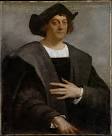 Christopher Columbus (1451-1506) was an explorer, cartographer (map maker), and adventurer from the Republic of Genoa (today it is part of northern Italy). In 1492, he led an expedition from Spain and discovered the islands of the West Indies. He died believing he had found a westerly route to Asia, but in reality he had opened up the continents of North America and South America for European discovery and colonization. Fifty years ago, Americans viewed Columbus as a hero, and schoolchildren across the country had the day off from school. Today, Columbus is honored by students in only a few states, and in many parts of our country he is viewed with great dislike. Columbus Day is celebrated in some places of the United States on the second Monday of October, sometimes falling on the day he discovered America, October 12th, 1492. In the 1400s, Western Europeans rapidly modernized, experienced a social mobility never before imaginable, developed high forms of art, and used technology in new ways. The Renaissance that had started in Italian city-states had spread north, and throughout Europe there was a sense that the world was waiting to be explored, discovered, conquered and civilized by those who were brave and eager enough. The Renaissance was a time where European artists and intellectuals rediscovered the beauty of the ancient Greek and Roman artists and intellectuals. City-states in Italy grew wealthy from trade with the East through the Mediterranean Sea, and countries in Western Europe wanted to be able to go directly to the East by the ocean, without having to go through the Mediterranean Sea and dealing with middle men. In 1492, the Spanish finally succeeded in liberating Spain from the African Muslims who had controlled them for over 700 years! After this 700 year war, Spain was filled with unbound confidence and believed it was a chosen country to explore, Christianize, and conquer the world. Ocean travel is challenging, but the European mindset, Spanish confidence, new technology, and vision of Christopher Columbus made such a huge journey possible. Christopher Columbus grew up in the Republic of Genoa. His dream as an adult was to sail west from Europe and go straight to Asia, where he could open up new trade routes with China. Nobody, of course, knew that in between Asia and Europe were the Americas. Nearly all sailors knew that the Earth was round, however, no sailor knew how far the journey from Europe to the next continent was, and there was fear of starving on ship if Asia was not reached. The Asian invention of the astrolabe, an instrument that made travelling at night and away from shore possible, helped sailors like Columbus have greater confidence to sail far away. King Ferdinand and Queen Isabella of Spain, fresh from their victory over the Muslims in 1492, agreed to allow Columbus to use Spanish ships and men to go on his quest. Columbus set out in three ships: the Nina, the Pinta, and the Santa Maria. His goals were to find a new trade route to Asia, to find gold and bring it back to Spain, to claim new land for Spain, and to spread Catholic Christianity throughout the world. After approximately 30 days, Columbus found the new land, however, as we know, it was not Asia, it was an island in the Bahamas. Columbus believed he had found India and called the natives “Indians.” Columbus made four different journeys to the Bahamas, established Spanish forts, was completely unsuccessful in finding any gold, and was arrested by the Spanish for being an incompetent and tyrannical governor of the new lands. Columbus’ men were so intent on finding gold that they mistreated many of the Indians they came into contact with. There are historical accounts of torture and murder by some of Columbus’ men. Columbus was either unable, or unwilling to stop them. The group of Indians Columbus first encountered, the Tainos, were extinct 50 years later. Most Indians who came into contact with the Spanish and other Europeans died from diseases, such as small pox. The natives did not have these diseases, and had no immunity built up against them. The Spanish King and Queen eventually arrested Columbus, had him brought him back in chains, tried him for incompetence and for the cruel treatment some of his men perpetrated against the Indians, and jailed him. In six weeks, the King released him. Columbus’ legacy in the new world is mixed. He discovered America and opened up new lands for the rest of the world. Before Columbus, Indians in the Americas worshipped many gods, many practiced torture and polygamy, and some practiced cannibalism as a way of life. Europeans who came and eventually settled the Americas brought monotheism, ended polygamy, and brought literacy to the Indians. Eventually, the United States of America was founded, as was all other modern nations of North and South America. Columbus’ discovery of America was the beginning of the founding of these modern nations. Columbus has also been the focus of those who argue that the European conquest of the Americas was an immoral act against the Indians. European disease, such as small pox, is believed to have killed up to 90% of the Indian population. And, the superior strength of Europeans meant that it was easier to destroy the Indian culture. Before the 1960s, American students and historians focused on the positive elements of Columbus’ discovery of America, and all America celebrated him. In 1971, Columbus Day became a federal holiday. After this, however, certain states began to take away the celebration of Columbus. In California, for example, students do not celebrate Columbus Day, and a public school teacher may hear his colleagues berate Christopher Columbus. In New York, however, Columbus is heralded as a hero, and New York City has a huge Columbus Day Parade that involves over 35,000 people every year. Unfortunately, over time, many American students do not even know anything about Christopher Columbus. Was Columbus a hero or not? That is a great question to ponder on Columbus Day, which is a federal holiday in the United States of America, celebrated on the second Monday of October. In many states where Columbus Day is not celebrated, students have stopped learning about him altogether. Questions 1. What did Columbus discover? 2. Who was he sailing for? 3. How did Californians celebrate Columbus in the 1970s? 4. Why do some Americans dislike Columbus today? 5. What is your opinion of Columbus? Was he a great man, a villain, neither? Explain your answer.
11 Comments
Mary Griffith
10/5/2016 03:46:45 am
To say that, "...the superior strength of the Europeans meant that it was easy to destroy the Indian culture." is not only terribly racist and offensive but also completely wrong. If the Native Americans had killed the European upon sight instead of teaching them how to survive (hence the holiday we celebrate as Thanksgiving), then the European diseases and greed would not have caused their extinction. Although this article is a good attempt at a thought provoking dialogue, such statements reveal the heart of many Europeans.
Reply
Jane Elder
10/5/2016 07:22:16 am
I think the author meant "superior strength of weaponry," not superior physical or mental strength. Mary, you are right that the Europeans did not have superior physical or mental strength to the Native Americans, and the sentence does not specify what kind of strength.
Reply
Rachel
10/5/2016 09:27:37 am
Jane, why (the reason) do you assume that Europeans "did not have superior physical or mental strength."
Jane Elder
10/5/2016 09:54:06 am
Rachel, I was not clear, but I did not say the Native Americans were mentally or physically stronger. We do not know. Both the Europeans and the Natives were human beings, and as human beings, some would have been stronger in some ways and others weaker. The way the article was written, it could be interpreted to indicate what Mary pointed out, that the Europeans were superior in multiple ways, and we don't know that. We do know they had superior weaponry. I do not believe that the author intended to say that the Europeans were superior in every other way. I regret that I did not write what I meant more clearly.
Rachel
10/5/2016 10:41:53 am
Hi Jane,
Rachel
10/5/2016 06:28:46 am
Mary,
Reply
John De Gree
10/5/2016 01:45:34 pm
Thank you for the spirited exchange of ideas! When I wrote the article, I thought of superior European military strength, and had not thought of any other kind of strength. However, we could discuss cultural strength, or moral strength, and that might be interesting. For the record, my ancestry is mainly Northwest European and a little American Indian!
Reply
bob jones
9/14/2017 01:11:05 pm
i dont like this
Reply
Mark Struble
10/14/2017 09:49:51 am
I do like it. It forces us to think about what we believe. As long as we all realize two things. 1 - that ALL of mankind (including ourselves) suffers under the effects and weight of sin. 2 - That it is only through loving, humble, truthful relationship, 1st with God, and 2nd with our fellow man can we hope for any deliverance from that sin. I think that the truth of the matter is that we as a culture have lost our way. We no longer trust one another. We do not believe the best in one another. We easily jump to conclusions, instead of pondering a statement, let alone an issue. We attempt to hold "others" accountable because we no longer have the clarity and will to hold ourselves accountable. If we would only follow Jesus, and remove the log out of our own eye first, then we might be better able to help "others". I resolve to follow Jesus as best as I am able that those I do come in contact with might see Him instead of me. And when I fail (which I will, because I like you am under the effects of sin) I hope I run into someone that will lovingly and humbly point me back to Him.
Reply
luffy
1/17/2021 02:39:21 pm
you women are acting dumb, Columbus was in fact a hero in that you a) wouldn't be in America. b) probably would not have your genetics you have, and c) you would not be speaking English. so Columbus was very important.
Reply
6/11/2022 02:30:40 pm
After this 700 year war, Spain was filled with unbound confidence and believed it was a chosen country to explore, Christianize, and conquer the world. Nice blog thank you!
Reply
Leave a Reply. |
John De GreeJohn De Gree writes the current events with a look at the history of each topic. Articles are written for the young person, aged 10-18, and Mr. De Gree carefully writes so that all readers can understand the event. The perspective the current events are written in is Judeo-Christian. Receive Articles and Coupons in Your EmailSign Up Now
For Email Marketing you can trust. Archives
June 2024
Categories
All
|
|
SUPPORT
|
RESOURCES
|
|


 RSS Feed
RSS Feed



